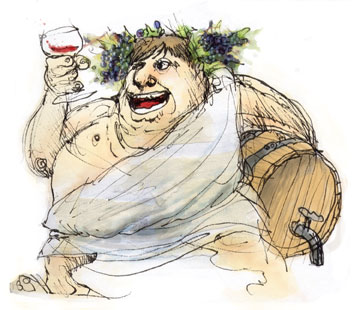
 Bacchus
Bacchus
Are you really the God of Wine? Perhaps not. Your stature is more Rubenesque than Romanesque. No matter, you just really enjoy a good toga party. Your blowsy Muscat-like nature is the highlight of any social gathering. It’s no wonder British Columbia winemakers regularly include you on the guest list for their vineyard parties, hoping your presence will help to soften the acidic nature of their debutante, Riesling. Keep on having fun Bacchus. But remember, don’t drink up too much of that sun; your act can get a little dumb.
Appellations Growing Bacchus Grapes
Appellations producing the most Bacchus wines:
- Vancouver Island (DVA)
- Okanagan Valley (DVA)
- Fraser Valley (DVA)
- British Columbia (Provincial Appellation)
|
|
|
|
|
|
Bacchus Grape Details

Named after the Roman god of wine, Bacchus is found in Canada’s westernmost province of British Columbia, in the United Kingdom, and most widely in its native Germany, where Bacchus flourishes in the heart of German bulk wine production and beer country. Two-thirds of Germany’s Bacchus plantings are found in the Rheinhessen with much of the rest in the Franconia district, an area famous for its Bavarian wheat beers and the unique smoky brews known as Rauchbier.
This productive cultivar was created by crossing Müller-Thurgau with a Silvaner-Riesling cross. Bacchus is a white wine-producing varietal that adapts to a broad range of climates and benefits from its ability to grow in less favorable vineyard sites than Riesling and even Müller-Thurgau. It produces full-bodied wines, with attractive fruit and floral characteristics, similar to Muscat. As an early budder, Bacchus can be susceptible to spring frosts, and its typical lack of acidity can prove challenging, particularly in hot vintages. In cool years, its inability to ripen fully and to express its Muscat-like character leaves it of less use to vintners who hope to use it as an effective acidity moderator in blends with Riesling and Sylvaner.
